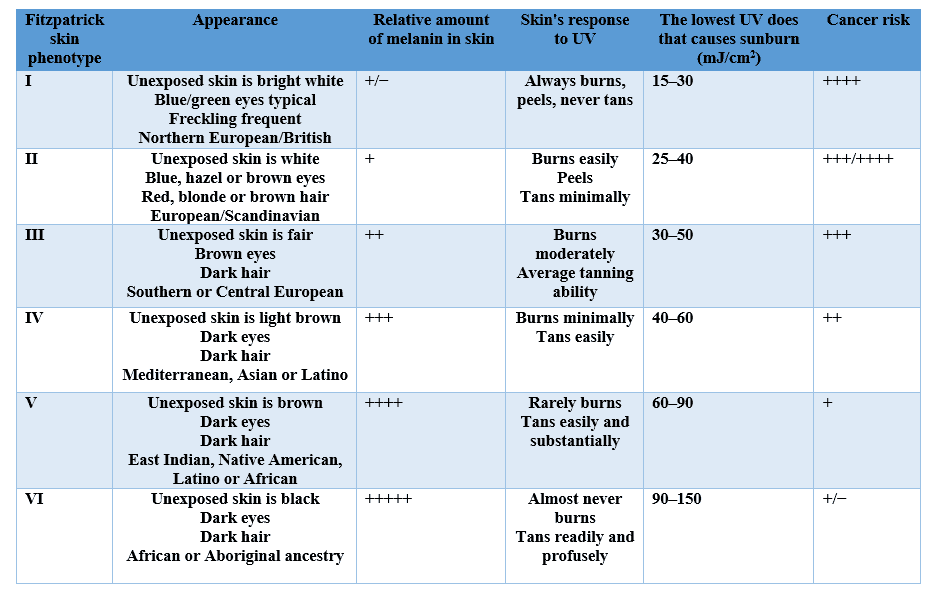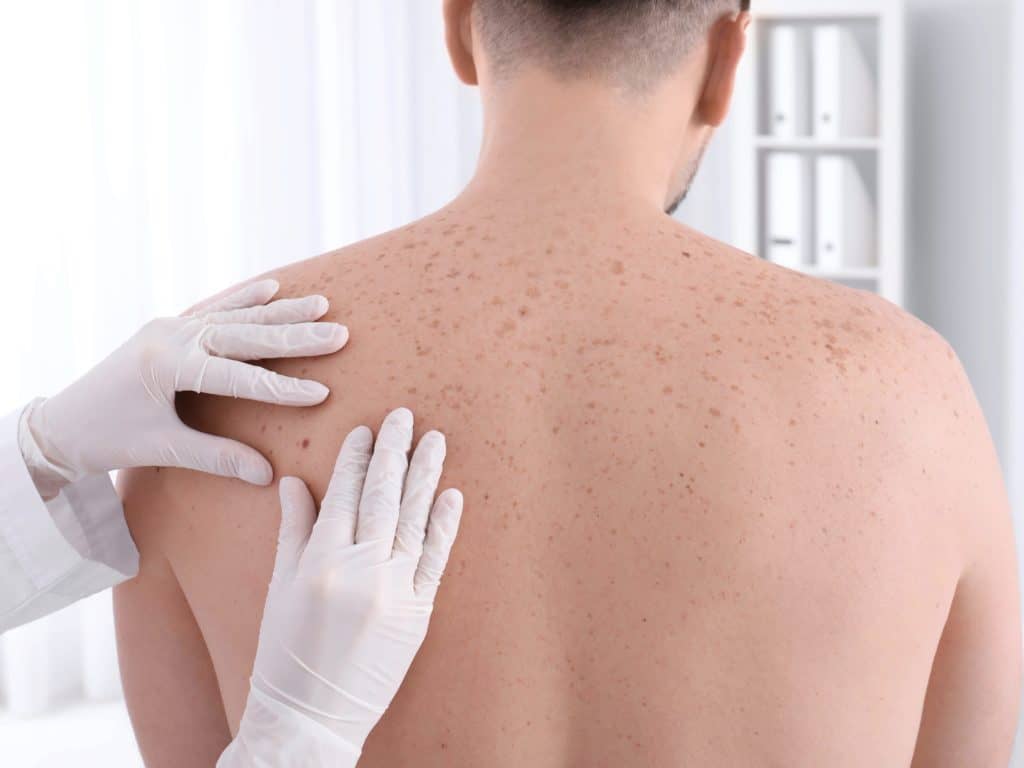Our skin is the largest organ in our body and a vital barrier to disease and injury. We need to protect it. As it is so exposed to the elements it takes the brunt force of harmful toxic substances and solar radiation. These are two common causes of skin cancer. At the same time, because our skin is so exposed and visible, we can theoretically detect and treat skin cancers early on. This requires attending a specialist skin cancer screening assessment.
In this post we will explore why you may be at increased risk for skin cancer, the typical signs and symptoms to look out for and why early detection, through a skin cancer screening, will lead to more promising outcomes than a later detection.
What increases your risk of skin cancer?
- Sunburn – getting sunburnt just once every 2 years can triple your risk of melanoma skin cancer, according to Cancer Research UK
- Having several severe sunburns before the age of 18 increases the long-term risk of melanoma.
- Having fair skin that freckles and burns easily
- Have more than 30 large and irregularly shaped moles is a risk factor for melanoma
- A family history of skin cancer
- Frequent exposure to strong sun
- Harmful mutations in skin cells accumulate over time
- Occupational exposure to harmful chemicals or excessive radiation.
- Having burn scars, skin ulcers or a HPV infection
Clearly the sun is a major cause of skin cancers. This is mainly due to UVB rays in sunlight We should all limit our risk through sensible sun exposure, however some of us simply have a higher genetic predisposition to skin cancer than others.
Skin cancer risk and melanin
The risk of skin cancer is higher in those with paler skin, as you can see from the table below, adapted from a 2013 review published in the International Journal of Molecular Sciences. This is because melanin blocks the sun’s UVB radiation from damaging DNA in skin cells.

If you have darker skin, don’t ignore the signs just because your risk is lower – Bob Marley died from a melanoma under his toenail. Skin cancer can be sneaky in this way and dark moles may not be as prominent against darker skin so they may be detected later.
It’s worth noting that the sun is incredibly important for helping us obtain adequate vitamin D3 levels and thus is important for our bone, skin, immune and overall health. In the UK, 1 in 5 of us are deficient in vitamin D, primarily due to a lack of sun. While this seemingly contradicts health guidelines to avoid excessive sun exposure for skin cancer prevention, as with every aspect of a healthy lifestyle, balance is key. To understand how much sun exposure you should have, read this blog post.
The most obvious warning sign of skin cancer is a change to either a new mole, an existing mole or the appearance of an unusual mark or lump.
Two common precursors to skin cancer are sunburn and actinic keratosis.
Sunburn occurs when melanin does not develop quickly enough and your skin cells become red, swollen and may even blister due to sun damage.
Actinic keratosis is a rough scaly patch on your skin that develops from years of exposure to the sun.
Remember that you don’t need to have had either of these precursors for skin cancer to develop though these will greatly increase the risk.
There are three main categories of skin cancer; basal cell carcinoma, squamous cell carcinoma and melanoma.
Signs and symptoms of skin cancer
- Basal cell carcinoma usually appears as a small, smooth, pearly or waxy bump on the face, ears or neck, or as a flat pink, red or brown lesion on the trunk, arms or legs. It is a benign cancer but can cause local invasion unless treated early.
- Squamous cell carcinoma can appear as a firm, red nodule, or as a rough, scaly flat lesion that may bleed and become crusty. It is a malignant cancer and can occasionally spread to other organs. Both basal cell and squamous cell cancers mainly occur on areas of the skin frequently exposed to the sun, but can occur anywhere.
- Melanoma usually appears as a pigmented patch or bump but can also be red or white. It may resemble a normal mole, but usually has a more irregular appearance. These are frequently highly malignant and unless detected and treated early can spread aggressively.
Signs of melanoma
- Asymmetry – the shape of one half doesn’t match the other
- Border – edges are blurred or jagged
- Colour – various shades of brown, black, tan, red, white or blue
- Diameter – A significant change in size (greater than 6mm), however any mole that increasing in size should be seen by a dermatologist as melanomas can be diagnosed at smaller diameters.
- Evolving – any spot or mole that is changing in colour, shape or size or itches or bleeds.
The ABCDE rule is very helpful when looking for a melanoma. However, in order to know for sure if a mole or lesion is cancerous, a skin cancer screening is necessary.

It is currently Sun Awareness Week 2020 (4th – 10th May) and many organisations are doing their part to increase recognition of the sun’s impact on our health. The UK Institute of Occupational Safety and Health (IOSH) have an award-winning campaign – No Time To Lose – which aims to explain to occupational causes of cancer and help businesses take action. Some brilliant tips to protect yourself and your employees from harmful UV radiation can be found in this article by Health & Safety Matters.
Why detecting skin cancer early is important
Detecting any illness early on usually leads to better outcomes. With skin cancer this is particularly pertinent. A lesion or mole, if cancerous may grow in various directions. Sometimes it grows down, deeper into the skin until it reaches a lymph vessel or a blood vessel. Cancerous cells may then break off and spread to other organs, progressing the cancer to stages 3, 4 and 5. At these stages the cancer is far more difficult to treat. Therefore, early detection is always better.
Melanomas are the most serious of the skin cancers. Whilst only contributing to 5% of all skin cancers, melanomas are responsible for 75% of all skin cancer deaths, usually because they spread quickly to other organs. Therefore, early detection is very important and why you should have a skin cancer screening if you are concerned.
Skin cancer screening in London
We recommend you attend a skin cancer screening with Echelon Health.
Based on Harley Street, London, Echelon Health offer the most comprehensive personal Health Assessments using combined scanning techniques and analyses by specialist consultant physicians. We don’t use statistical models to estimate your risk of disease, instead we assess you as an individual and detect for over 92% of the diseases that, if left undetected, could lead to premature death. This figure is 95% in women.
Echelon Health are partnered with The Mole Clinic who are experts in their field of dermatology and skin cancer. You will undergo a full body skin cancer screening as part of our Platinum packages so that you can live a long and healthy life, free from worry.
Request a call back
Sources
Healthline – Skin Cancer Symptoms
International Journal of Molecular Sciences – UV Radiation and the Skin



